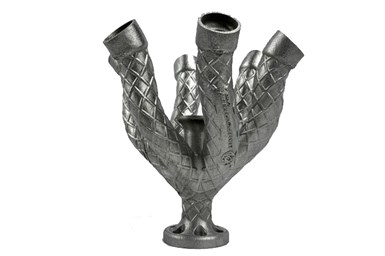UniFuse IN625 Nickel Alloy for LPBF for Higher Throughput, Superior Mechanical Properties
Uniformity Labs says its IN625 nickel alloy powder provides more repeatable and reproducible mechanical properties across the build bed, printed at far higher throughput.

Propulsion exhaust printed with UniFuse IN625 Nickel Alloy. Photo Credit: Uniformity Labs
Uniformity Labs has developed its UniFuse IN625 Nickel Alloy and optimized parameters for LPBF printing at 60-micron layer thickness. The high-density multimodal Inconel 625 powder and 60-micron layer thickness high-performance scanning (HPS) parameters are designed for printing in machines with 400-W lasers.
The powder material can also be printed under typical scan parameters at different layer thicknesses and laser powers with improved mechanical properties or with increased laser speed and throughput at comparable properties.
According to the company, in one example build of a part typically printed in Inconel 625, Uniformity HPS parameters at 60-micron layer thickness and 370-W power achieved a 2.1 times faster exposure time and comparable or superior mechanical properties compared to competitors’ 40-micron layer thickness scan strategies targeting best-in-class mechanical properties. It is said this throughput improvement is typical for UniFuse IN625 builds.
The higher tap density and optimized particle size distribution of Uniformity multimodal powers create a highly uniform, denser powder bed, yielding more repeatable part builds at the highest throughput. This enables customers to utilize Uniformity powders to produce parts with improved and stable mechanical properties, even while printing at significantly higher build rates.
“We continue to demonstrate outsized value to our customers, harmonizing AM materials and processes to deliver production-scale additive manufacturing,” says Uniformity founder and CEO Adam Hopkins. “Our powders deliver repeatable mechanical properties and surface finish uniformly across the print bed even when printing at throughputs that greatly exceed those possible with other powders. Our no compromise approach to AM enables our customers to realize cost-effective serial production.”
Uniformity Labs says it is addressing the industry challenge of economically achieving serial production in AM by developing and producing highly advanced ultra-low porosity metal powder feedstock. Currently in production under the product brands UniFuse (for LPBF) and UniJet (for binder jetting), and with its high-performance scanning strategies, Uniformity Labs has dramatically improved the ability to produce high-quality parts repeatedly and at scale – enabling AM to become an increasingly better-established serial production tool.
- Learn about Uniformity Labs’ UniFuse AlSi10Mg aluminum powder which is an ultralow porosity aluminum powder for LPBF said to deliver high-speed, high-quality parts repeatedly and at scale for metal additive manufacturing.
- Read this post on Uniformity Labs’ ultralow porosity UniFuse 316L 90-micron stainless steel powder which features corrosion resistance, high flexibility and excellent mechanical properties at extreme temperatures.
Related Content
-
Beehive Industries Is Going Big on Small-Scale Engines Made Through Additive Manufacturing
Backed by decades of experience in both aviation and additive, the company is now laser-focused on a single goal: developing, proving and scaling production of engines providing 5,000 lbs of thrust or less.
-
Preassembled Turbojet Engine, 3D Printed in One Build: The Cool Parts Show #75
Turbojet engines typically consist of hundreds or thousands of parts, but this engine — 2023 winner of The Cool Parts Showcase for Best Proof of Concept — was 3D printed as just two pieces, with the monolithic rotor embedded inside the stationary engine shell.
-
Top 10 Additive Manufacturing Stories of 2023
Laser powder bed fusion, proprietary AM processes, machining and more made our list of top 10 articles and videos by pageviews this year.














